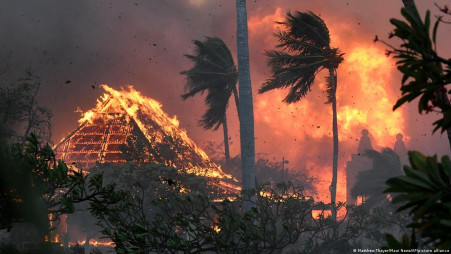Hawaii fire death toll hits 99, may double, warns governor
Last week's inferno on the island of Maui is already the deadliest US wildfire in a century

The death toll in Hawaii's wildfires rose to 99 and could double over the next 10 days, the state's governor said Monday, as emergency personnel painstakingly scoured the incinerated landscape for more human remains.
Last week's inferno on the island of Maui is already the deadliest US wildfire in a century.
But Governor Josh Green said more fatalities are certain, as emergency responders with cadaver dogs work their way through hundreds of homes and burned-out vehicles.
"The updated number of 99 confirmed people have passed," he told CNN on Monday.
He added: "It will go up very significantly... Over the course of the next 10 days, this number could double."
The historic Maui coastal town of Lahaina was almost destroyed by the fast-moving blaze last week, with survivors saying there had been no warnings.
Green said rescue workers were finding between 10 and 20 dead bodies each day, with only a small portion of Lahaina near the waterfront searched so far.
The number of people still missing is down to around 1,300, although delays restoring cell phone communications have made it difficult for residents who fled to reconnect.
"Our hearts will break beyond repair, perhaps, if that means that many more dead. None of us think that, but we are prepared for many tragic stories," he told CBS earlier.
The town, which served as the Hawaiian kingdom's capital in the early 19th century, was home to around 12,000 residents, as well as a bustling tourist street packed with shops and restaurants.
Now, "there's nothing to see except full devastation," said Green, who has visited the smoldering streets of rubble and ash multiple times.
The intensity of the fire and scale of the destruction have made identification of human remains difficult, with some corpses disintegrating as they are uncovered by searchers.
Police are encouraging those with missing relatives to give DNA samples that might speed up the process.
"This is an amazingly devastating fire and the conditions... are extraordinarily difficult to work through," Jeremy Greenberg, a Federal Emergency Management Agency official, told a press briefing Monday.
'Abysmal'
The wildfire is the deadliest in the United States since 1918, when 453 people died in Minnesota and Wisconsin, according to the nonprofit National Fire Protection Association.
Questions are being asked about authorities' preparedness and response to the catastrophe.
Some fire hydrants ran dry in the early stages of the wildfire as a result of the "intense operations and water usage" by firefighters, deputy US fire administrator Tonya Hoover said.
A class-action lawsuit has been filed against Hawaiian Electric, the state's biggest power firm, claiming the company "inexcusably kept their power lines energized during forecasted high fire danger conditions."
Hawaiian Electric said in a statement that the company does not comment on pending litigation, and noted that the cause of the fire has not yet been determined.
Whatever sparked the terrifying inferno, a collision of circumstances -- including a churning hurricane off the coast -- meant that it spread very quickly.
Maui suffered numerous power outages during the crisis, preventing many residents from receiving emergency alerts on their cell phones.
No sirens sounded, and many people in Lahaina learned about the blaze from neighbors running down the street or seeing it for themselves.
Attempts to allow residents back into Lahaina descended into chaos Monday, as a placard system identifying those permitted to travel was suspended after barely an hour.
"The miscommunication is abysmal -- people are very angry and frustrated, and this is getting worse," said Stephen Van Bueren, 42, a local church pastor who waited for more than an hour to get a placard, without success.
"They are restricting everyone, they are blocking access. Why are they keeping people away?"
'Aloha spirit'
Maui's fires follow other extreme weather events in North America this summer, with record-breaking wildfires still burning across Canada and a major heat wave baking the US southwest.
Europe and parts of Asia have also endured soaring temperatures, with major fires and floods wreaking havoc.
Scientists say human-caused global warming is exacerbating natural hazards, making them both more likely and more deadly.
In Lahaina, a few thousand buildings were damaged or destroyed as the fire tore through the town, according to official estimates, wreaking more than $5 billion in damage.
Hundreds of hotel rooms are being made available for free to victims, with long-term rehousing options using Airbnb vacation homes also being explored, said Green.
Officials on Monday downplayed fears about more incoming adverse weather. Tropical Storm Greg is expected to pass a few hundred miles south of Maui later this week.
Meanwhile, communities have been launching their own initiatives to cope with the tragedy.
Volunteers at the University of Hawaii culinary school in Kahului, 30 miles (50 kilometers) east of Lahaina, cranked out thousands of fresh meals on Sunday for those affected.
"Some of our chefs have lost their homes (in the fire), and they're right here right alongside us cooking for their community," Sheldon Simeon, a Maui-based chef known nationally as an ambassador of Hawaiian cuisine, told AFP.
"Just gives you a sense of what the 'aloha' spirit is," Simeon said.


 Keep updated, follow The Business Standard's Google news channel
Keep updated, follow The Business Standard's Google news channel
















